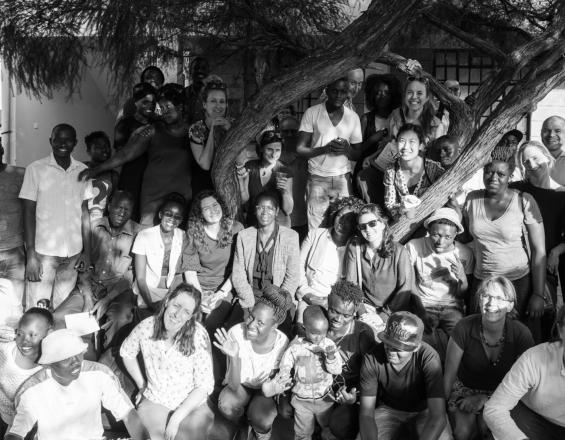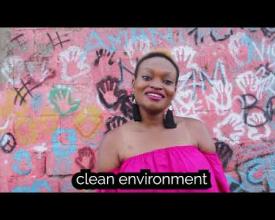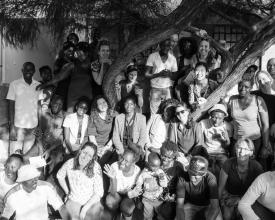
Protecting human health, climate and the environment through abatement of air pollution using participatory approaches

Air pollutants affect human health, (agro-)ecosystems and the climate, thereby hindering the achievement of SDG 3, 7, 11 & 13. People with lower socio-economic status are affected most (through personal exposure and increased food prices), partly due to their limited awareness of the issue. One Health approaches to better air quality for improved human and (agro-)ecosystem health need to account for local knowledge, cultural practices and priorities.
A pilot study with various local stakeholders carried out in Nairobi trialed a new co-created transdisciplinary approach to air pollution awareness using interviews, storytelling, participatory mapping, theatre, playful activities and music. This transferable solution can lead to an improved understanding of the issue across affected communities, thereby empowering them to demand from policymakers the development and implementation of effective, inclusive air pollution abatement policies.
Context
Challenges addressed
Air pollutants affect human health, (agro-)ecosystems and the climate. Health effects include respiratory illnesses, heart diseases and reduced resistance to infections (potentially also to Covid-19), mainly caused by particulate matter and ozone. Reduced (crop) plant growth and productivity leading to yield losses are the main effects on (agro-)ecosystems caused by ozone, but effects on biodiversity have also been reported. Lastly do some air pollutants contribute to global warming.
There is evidence that disadvantaged people in developing countries and emerging economies are those affected most due to their living environment and habits (dense housing, in-door open cooking and heating etc.), lack of access to clean fuels and limited awareness and knowledge of the problem. This also hinders affected communities to engage with the development of respective air pollution abatement policies, which increasingly follows participatory approaches.
Location
Process
Summary of the process
Innovative solutions to air pollution do account for local knowledge, cultural practices and priorities of the intended users of these solutions.
Building Blocks
Solutions accounting for local knowledge, cultural practices and priorities
Approaches to better air quality through reduction of emissions contributing to increased human health, a healthier environment, food security (through better crop yields) and climate protection need to actively include the participation of the wider public in order to appropriately address the needs of those affected and to increase their knowledge and awareness of this environmental threat. This can only be achieved through the development and implementation of approaches that account for local knowledge, cultural practices and priorities of the intended recipients of interventions.
Enabling factors
- Include a wide range of local stakeholders in pilot studies
- Use co-created transdisciplinary approach to (air pollution) awareness using methods appreciated by affected communities including interviews, storytelling, participatory mapping, theatre, playful activities and music
Lesson learned
Contrasting definitions of the problem (air pollution), unexpected solutions to the problem, differing perceptions of who was responsible for enacting solutions and an overall view that the problem (air pollution) cannot be seen in isolation from other issues faced by settlement residents were the main lessons learned from the project.
Innovative solutions to air pollution
Co-created transdisciplinary approaches using methods such as interviews, storytelling, participatory mapping, theatre, playful activities and music can contribute to air pollution awareness and solutions to improved air quality. This approach accounts for local knowledge, cultural practices and priorities of the intended recipients of interventions, thereby making these interventions and respective air pollution abatement policies more effective and inclusive.
Enabling factors
- Use of a mixture of qualitative, participatory and creative approaches to engage with a wide range of stakeholders can lead to an improved understanding of air pollution (and its effects on human and ecosystem health) and appropriateness of respective solutions
- Communication between affected communities and policymakers at equal and appreciative level
Lesson learned
- Contrasting definitions of air pollution
- Unexpected solutions to the problem
- Differing perceptions of who was responsible for enacting solutions
- Overall view that air pollution cannot be seen in isolation from other socio-environmental issues faced by settlement residents
Impacts
The solution described here helped to raise awareness of the sources and effects of air pollution with regard to human health and the environment in an informal settlement. It also helped to identify appropriate solutions to better air quality through a combination of qualitative, participatory and creative approaches that can contribute - in direct collaboration with policymakers - to the development of respective policies that will be effective and inclusive.
The approach piloted uncovered perceptions and explored assumptions in a more equitable way, helping to move towards equalising power dynamics. By working in partnership with community members, the community-created outputs were able to reach large (and varied) audiences. This is particularly important given the collaborative partnerships at all levels required to achieve the SDGs by 2030. The pilot also revealed that air pollution was part of much broader environmental, economic and social issues that the population faced on a daily basis in the informal settlement. Hence, successful solutions to the issue of air pollution and its effects on human health, the environment and the climate cannot be considered in isolation from other issues (informal settlement) residents face on a day-to-day basis.
Beneficiaries
- Urban informal settlement residents in Nairobi and more generally developing countries.
- Urban and peri-urban (agro-)ecosystems in Nairobi and more generally agricultural areas downwind from agglomerations in developing countries.
Sustainable Development Goals
Story
Air Pollution in Mukuru – A digital story:
https://www.youtube.com/watch?v=NjetxTMHfaE


